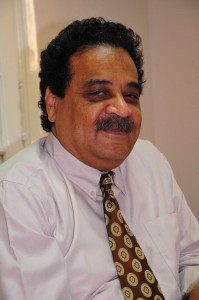
In the previous article, we discussed the secret conflict raging between supporters of the old regime and advocates of a democratic state. We discussed in detail the nature of the supporters of the old regime, and the different fault lines which exist within this group, in addition to the propensity of those from the the ruling bureaucratic class to reinvest their wealth into the private sector, as if in attempt to revive their long-time competitor. We also discussed the political void which existed within the country, and the futile attempts of the country’s security forces to fill it. It was Egypt’s Islamists who were successful in filling this void, which was left wide open through the back door. When we say “back door” we are referring, of course, to that of the mosque, and religiosity, which, although initially apolitical in nature, began to serve as a powerful political tool, capable of filling the void discussed previously.
Why did supporters of the old regime, and in particular those of the old police state, return to the political scene, after hiding under the banner of 30 June revolution, allowing the youth and the country’s democracy movement to appear in control? Well, firstly, changes occurred on the ground during this time which pushed the country’s balance of power towards this direction. I am speaking primarily of the popular protest movement to overthrow the Brotherhood, which represented no less than 75% to 80% of the Egyptian people, some of whom, as part of their demands, called for the Brotherhood to be “burned” and “slaughtered”. The country’s political parties were not capable of meeting these last demands, as they did not possess the tools to “chop” or “burn” anyone. Naturally, the country’s security forces were called on to perform this role. It makes sense that the people did not trust Egypt’s various political parties to confront the Brotherhood; their role would be limited only to words and rhetoric. Those who would be credited with taking action on the ground, would be those who were capable of removing the Brotherhood from the political scene, dispersing sit-ins, confronting protesters and arresting Brotherhood leaders. Those who did that, of course, were the country’s security forces, who we should, by the way, continue to encourage to confront the Brotherhood with the same level of stringency. Members of the old regime and advocates for the revival of a police state immediately latched onto this reality, feeding and mobilising it by attacking and criticising political parties, and in turn praising the efforts of security forces.
The second change, which we can consider a result of the first change we described (which itself occurred as an independent phenomenon), is the increase in popularity of General Sisi, who, for those who hate the Brotherhood, has become one of the most beloved figures in Egyptian politics since Gamal Abdel-Nasser. He has become a symbol to rally around for those who support the revival of a police state, who have dubbed him as their true representative. In their estimation, Sisi is a valuable asset: on one hand, because he is extremely popular, but more so because he was able to build this popularity on the fact that he was the only man capable of removing the Brotherhood from power. Everyone knows that, without the army, the Muslim Brotherhood militias would have been able to triumph in the face of their opponents, despite the large numbers that took to the streets on 30 June.
Those who support the reestablishment of a police state know that they do not possess an attractive political platform, a fact which perhaps has pushed them to crack down even harder on politicians and political parties. For this reason, they have also pressured Sisi, showering him with praise, to become the new President of the Republic and in turn revive the old Mubarak regime, particularly in a way that resembles the last several years of his rule. This position appears attractive to many because it possesses widespread popular support, and because it may be successful in mobilising state forces to finally implement the type of administrative and economic reforms needed by the country. Implementing such reforms is an urgent need for a regime founded on popular support, however, this is difficult to achieve. Implementing such reforms through a democratic process is impossible, and instead requires reliance on a strong state, i.e. a tyrannical police state, whose power is rooted in its ability to attack and repress.
I feel that Sisi himself did not plan for such a scenario, and does not personally wish to respond to the need to revive Egypt’s old police state. His actions and words demonstrate that he realises that more harm than good will occur as a result of his rise to power, and that responsibility for the ruling and administration of the country falls on the shoulders of politicians. Mubarak’s men, who have been stained by corruption, cannot fill this role, nor can security officers, who have little experience ruling a country during such difficult circumstances.
Many of Egypt’s democracy advocates have unfortunately failed to confront the supporters of a police state, adopting a defeatist attitude as a result of the fact that they feel they possess little leverage. They beg the state to bestow upon them some role, reinforcing that which was initially supposed by the country’s popular protest movement, and later repeated by Egypt’s security forces: that such parties and democracy activists do not, in fact, have honour. They have left state agencies to perform their role, buying into the belief that we are embroiled in a “battle” against terrorism, a mentality which reinforces the notion that, “nothing takes precedence over success in battle”. We all remember such words being used as a justification for repression during the country’s previous wars against Israel, and again during the 1980’s and 1990’s with the resurgence of domestic armed militant groups, who themselves grew up and were raised in the 1970’s. Once again, today we hear the phrase, “nothing takes precedence over success in battle” being repeated, while the country’s experiment in democracy continues to be delayed. There are many democracy advocates, from both the left and right of the political spectrum, who support entering into an alliance with the country’s security forces and Adly’s government, due to the perceived threat of terrorism from the Muslim Brotherhood and their supporters.
On the other hand, true democracy advocates believe that fighting terrorism requires that democracy be implemented to its fullest extent. The rise of the Brotherhood to power in Egypt’s first democratic elections after the outbreak of the 25 Januaryrevolution was an expression of the popularity they were able to mobilise during the reign of Hosni Mubarak. The decrease in popularity they witnessed several months afterwards, however,came as a result of their failure to meet the desires and wishes of the people within a democratic context, or present alternative visions to those put forth by other political parties.
The failure of the Brotherhood to mobilise large numbers of supporters in recent weeks is not the result of military crackdowns or the fact that their leaders have been arrested, but rather evidence of their decreased popularity, and lack of conviction felt by their supporters and sympathisers with regards to the organisation’s policies and vision. This is largely attributable to previous efforts exerted by the country’s opposition parties and democracy advocates.
Democracy advocates and the parties which represent them must preserve their independence, and negotiate with members of the country’s security forces from a position of power, in opposition to the goals and policies of the latter. Even if there does exist a soft alliance between the two sides in the country’s fight against terrorism, this does not mean a total alliance, or one that is subservient to the wishes of the country’s security forces.




